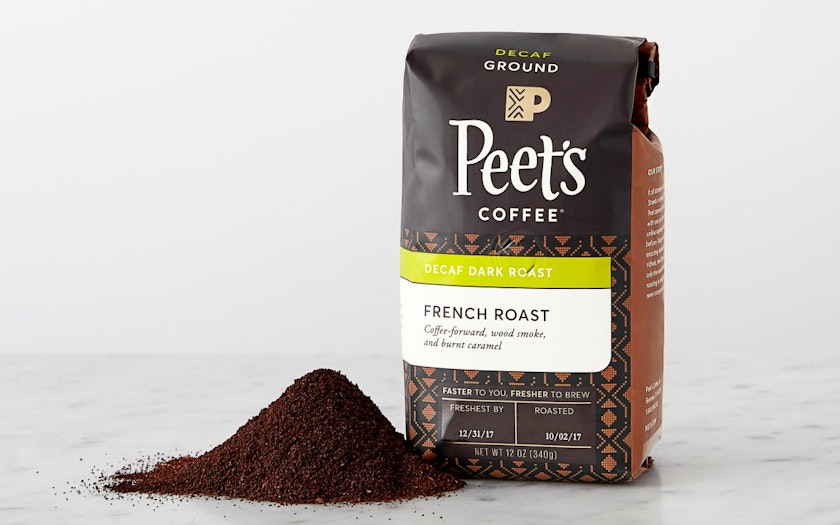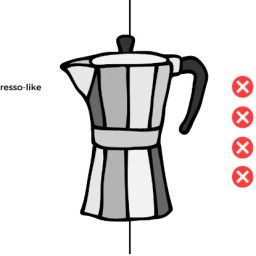
Decaf French roast coffee is a unique beverage that appeals to coffee lovers who seek the robust flavors of a dark roast without the caffeine kick. This type of coffee is characterized by its bold, deep roast that often exudes a smoky aroma complemented by subtle hints of dark chocolate.
The beans are roasted until they are nearly black, which imparts a distinct intensity to the flavor that’s rich and full-bodied. Ideal for those sensitive to caffeine or looking to reduce their intake, decaf French roast offers the pleasure of coffee with fewer side effects.
Key Attributes and Benefits
- Flavor Profile: Rich, smoky, and bold with notes of dark chocolate.
- Caffeine Content: Minimally present, making it suitable for evening consumption or for those avoiding caffeine.
- Brewing Methods: Optimal in methods that highlight its depth, like the French press or espresso.
Health Benefits:
- Choosing decaf coffee can significantly reduce caffeine-related symptoms such as jitters, anxiety, and sleep disturbances, while still allowing the enjoyment of coffee’s rich and satisfying taste.
Best Brewing Methods for Decaf French Roast Coffee
To fully appreciate the depth and complexity of decaf French roast coffee, certain brewing methods stand out:
French Press: This classic method is perfect for decaf French roast due to its ability to extract the deep, bold flavors inherent in the beans. The French press uses a coarser grind and a longer steeping time, which together help capture the essence of the coffee, from its smoky base notes to its rich, chocolaty undertones.
Pour-Over: For those who love a cleaner, more nuanced cup, the pour-over method is ideal. It allows the subtler aspects of the decaf French roast to shine, such as its underlying sweetness and slight acidity, providing a balanced cup that’s both bold and smooth.
Health Benefits and Considerations
Opting for decaf over regular coffee can bring notable health benefits, particularly for those sensitive to caffeine. The most immediate benefit is a significant decrease in caffeine-related side effects such as anxiety and insomnia. Decaf allows coffee enthusiasts to enjoy a cup later in the day without worrying about it affecting their sleep patterns. It’s also a good choice for those who experience digestive issues from caffeine, as decaf tends to be gentler on the stomach.
However, it’s important to note that decaf coffee is not completely caffeine-free. While the levels are much lower, there is still a small amount present, which might affect those who are extremely sensitive to caffeine. Additionally, the chemical process used to remove caffeine can sometimes leave behind chemical residues, though this largely depends on the decaffeination process used.
Origin and Sourcing
Decaf French roast coffee typically comes from the same robust regions known for their quality coffee beans, such as Latin America. Countries like Colombia and Brazil are popular for their extensive coffee farms that produce rich, full-bodied beans suitable for the dark, intense roasting required for French roast.
The decaffeination of these beans is commonly achieved using methods like the Swiss Water Process or the use of carbon dioxide, both of which aim to maintain the bean’s inherent flavors while removing caffeine. The Swiss Water Process, for example, is entirely chemical-free, using only water to gently extract caffeine. This method not only preserves the beans’ flavor profile but also appeals to health-conscious consumers looking for a natural approach to decaffeination.
Choosing the Right Decaf French Roast Coffee
When selecting a high-quality decaf French roast coffee, it’s essential to understand the labels and certifications that indicate superior and ethical production practices. Look for organic certifications to ensure the coffee is grown without synthetic pesticides and fertilizers, which not only supports healthier ecosystems but also promotes better health for consumers.
Fair Trade certification is another crucial label to consider. This certification means the coffee farmers receive a fair price for their beans, contributing to sustainable development and better community welfare. Fair Trade also emphasizes transparent working conditions and environmental responsibility.
Additionally, seek out products marked with “Swiss Water Process” or “CO2 Process” for decaffeination. These methods avoid the use of chemical solvents and are known for better preserving the coffee’s original flavor profile.
FAQs
How is caffeine removed from coffee?
Caffeine is removed using various decaffeination processes, the most common being the Swiss Water Process and CO2 Process. The Swiss Water Process involves soaking the beans in hot water to dissolve the caffeine, then passing the water through a charcoal filter to capture the caffeine. This method is chemical-free and retains the coffee’s flavor. The CO2 Process uses carbon dioxide in a liquid state under high pressure to extract the caffeine, which is also effective in preserving the coffee’s essential oils and flavor.
Does decaf coffee taste different from regular coffee?
Decaf coffee does taste slightly different from regular coffee, primarily due to the changes it undergoes during the decaffeination process. While modern methods strive to maintain as much of the original flavor as possible, some subtle differences can include a milder flavor and a slightly different aroma profile. However, high-quality decaf, especially when properly roasted and brewed, can still provide a satisfying coffee experience very close to its caffeinated counterpart.
Final Thoughts
Decaf French roast coffee offers a robust option for those who love the rich, deep flavors of a dark roast without the caffeine. With its bold, smoky notes and hints of chocolate, it appeals to coffee lovers who either cannot tolerate caffeine or wish to avoid it due to health reasons, such as anxiety or sleep disruption. Ideal scenarios for choosing decaf French roast include enjoying a late-evening cup of coffee without disturbing sleep or pairing it with a dessert when caffeine might be undesirable.









